Ministry of Foodies Review
Cuisine: Japanese Fusion
Average price per person: 150€
Environment: 9/10
Food: 9/10
Service: 9/10
Other: Solo dining, Gluten-free options, Vegetarian options
Website: www.ugochan.com
Ugo Chan is a restaurant that doesn’t really “shout” its presence but instead lets the anticipation simmer from the moment you cross the threshold. Subtle, sleek, and humming with intent. The chef, Hugo Muñoz, weaves together Japanese culinary tradition with the boldness of Spanish cuisine.
But this isn’t fusion for fusion’s sake. Ugo Chan is Muñoz’s tribute to both his heritage and his obsession with detail. Named after his childhood nickname, the restaurant is both playful and precise. Since opening in 2021, it has not only garnered a Michelin star but also a devoted group of diners coming back not just for the food, but for the feeling that, here, anything might happen.
It was on my list to visit for quite some time, although I had trouble accessing their website for a reservation in the past couple of months. I managed to do it finally (seems the website is working now) and I visited on a Saturday for dinner.
Location/Environment
The restaurant is located close to Madrid’s business district of Paseo de la Castellana. This unassuming spot has become something of a pilgrimage site for those looking for all the possible combinations Japanese fusion has to offer.
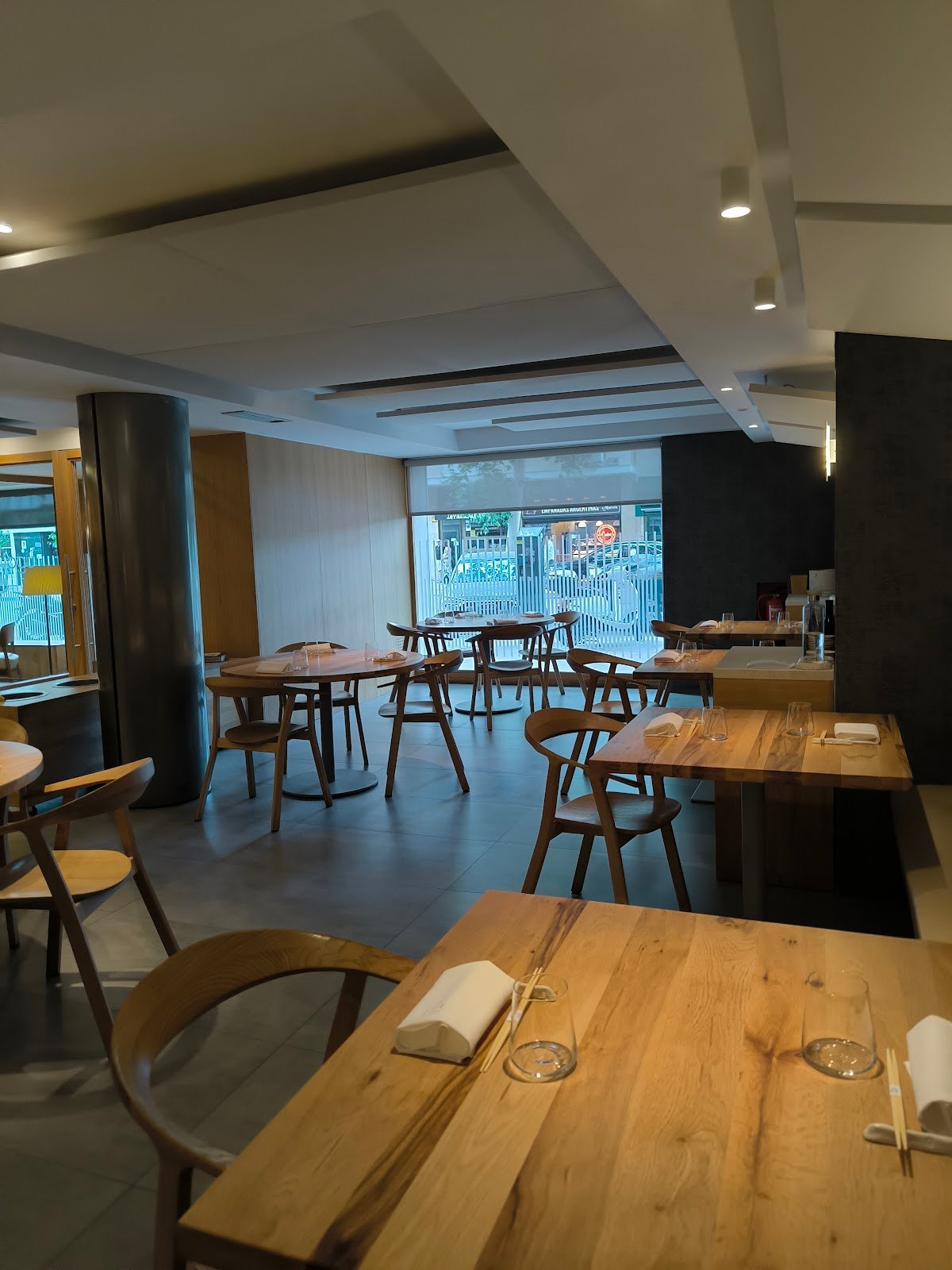
Wooden tones, a pair of sushi-style counters and overall an elegant setting without being overly posh. Excellent attention from the staff that was explaining all the dishes in detail and was overall quite pleasant,adding value to the overall experience. However, I will point out that not everyone spoke English quite well (good chance to practice my Spanish anyway), although the staff attending to me was quite pleasant nevertheless.
Chef Hugo Muñoz was at the restaurant on that day and he made a point to come and check in on everyone early in the night which was a nice touch.
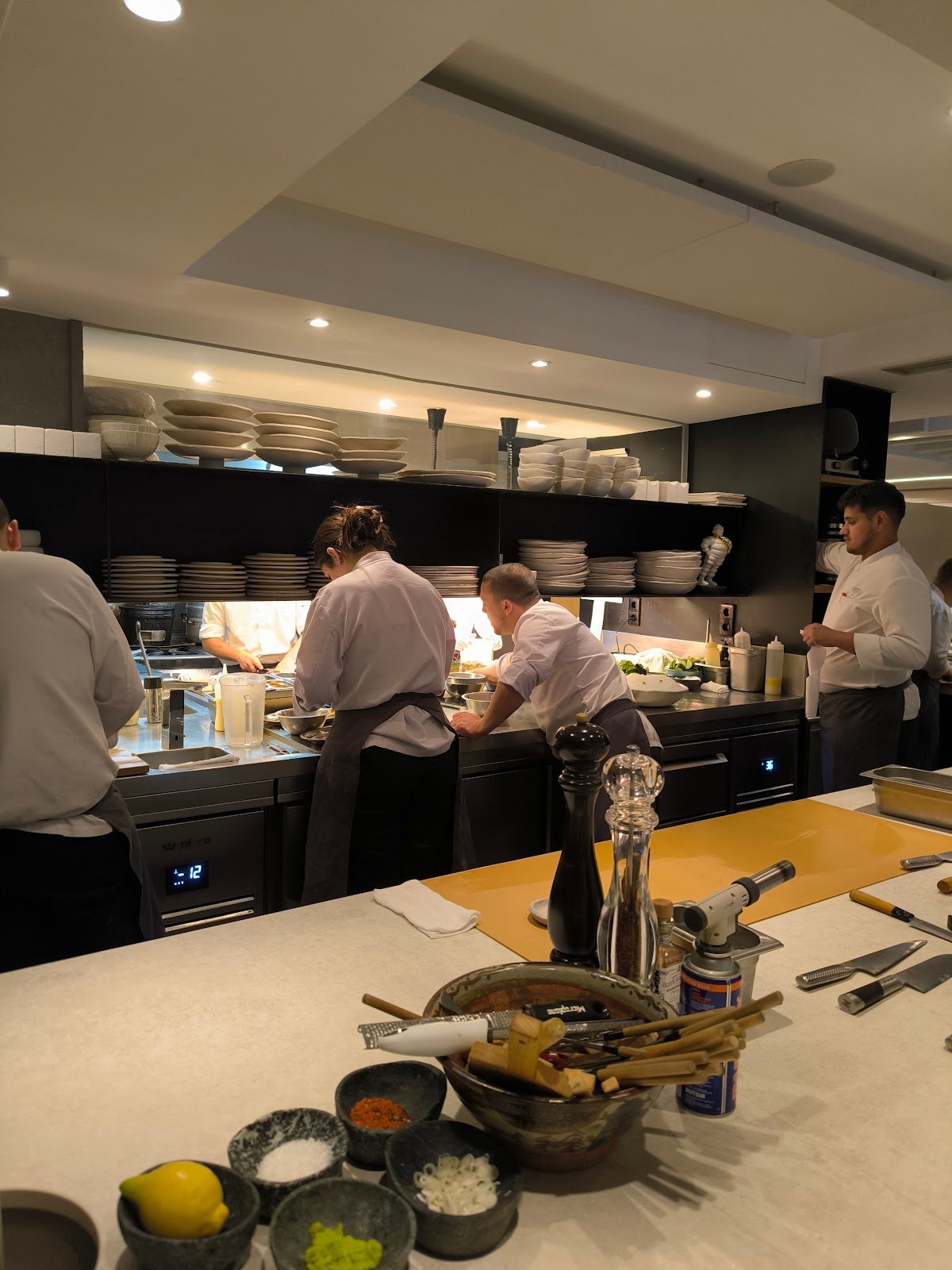
I was seated at one of the sushi counters and where all the magic was taking place. I could hear the head of the kitchen (not Chef Hugo, but his kitchen head) was a bit vulgar. While I don’t personally mind hearing this kind of language, hearing cabron and puta madre (even when not directed to anyone)in a Michelin star open kitchen was a bit weird.
Ugo Chan – Menu
Ugo Chan has two menu options, one à la carte and an omakase menu (short, medium, or long)which takes into account the diner’s preferences, appetite and taste. The dishes all have as their core Japanese cuisine combined with elements from international cuisine, in particular Spanish.
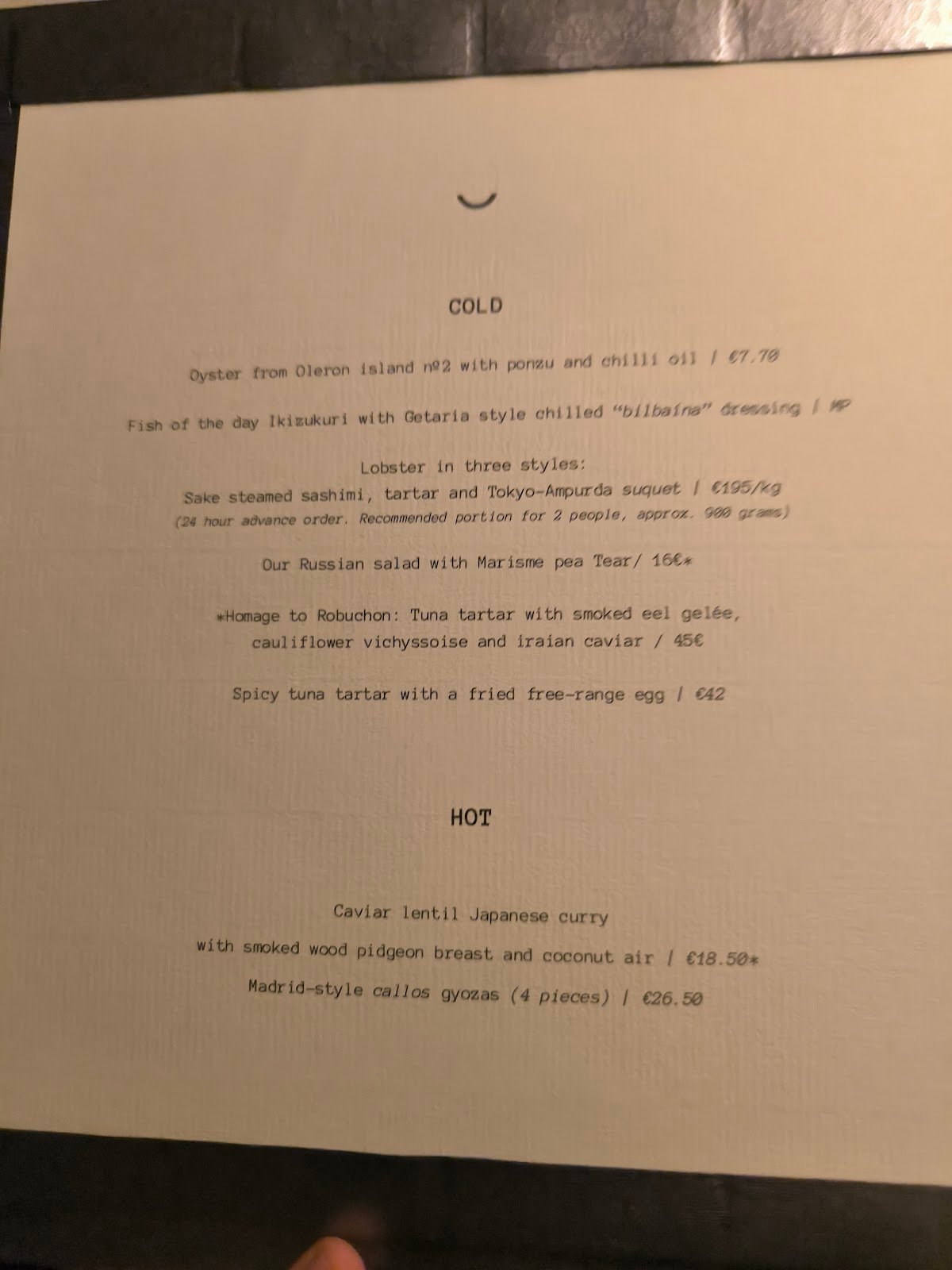
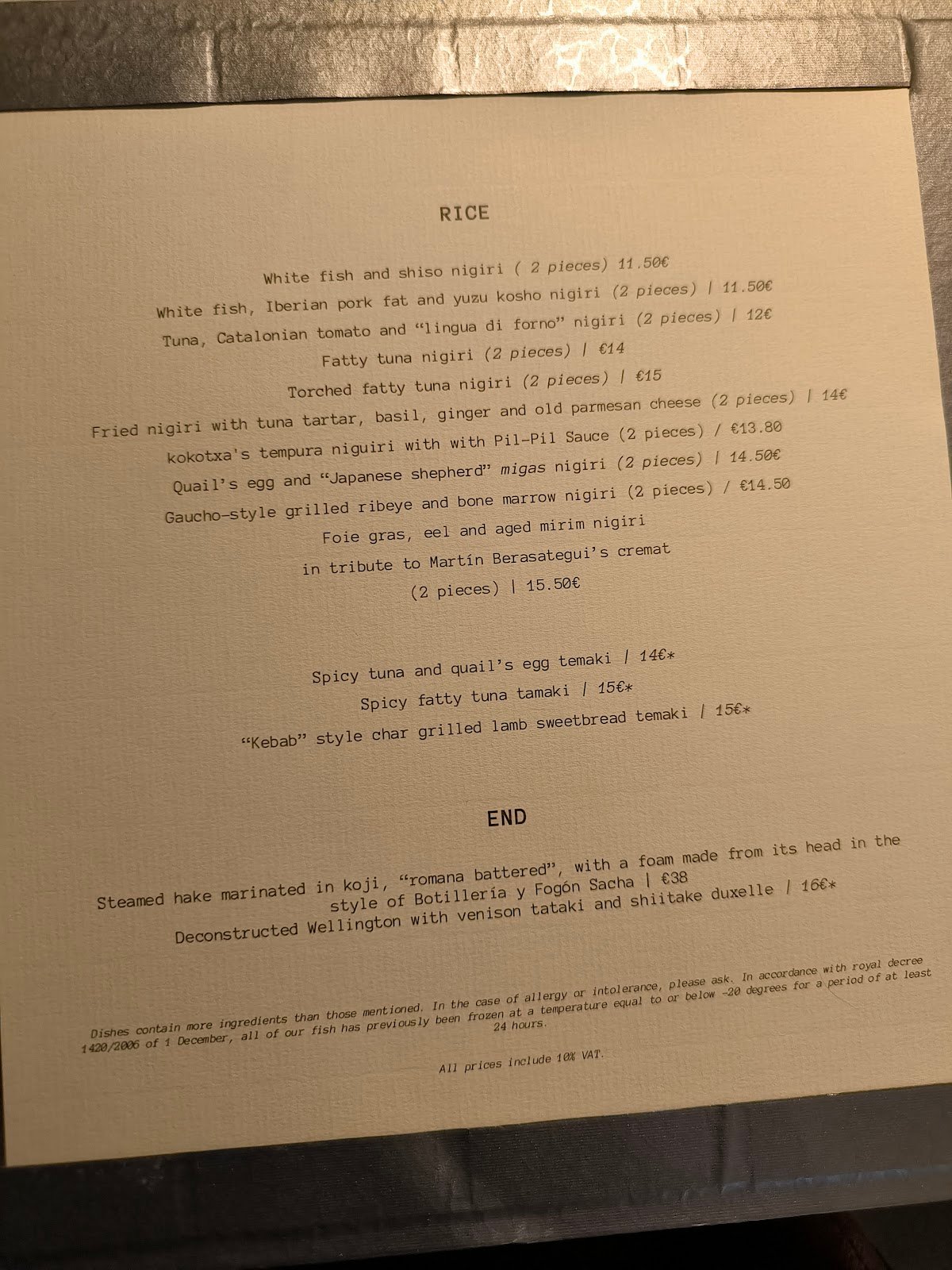
Apart from wine options, there is a very interesting cocktail list available.
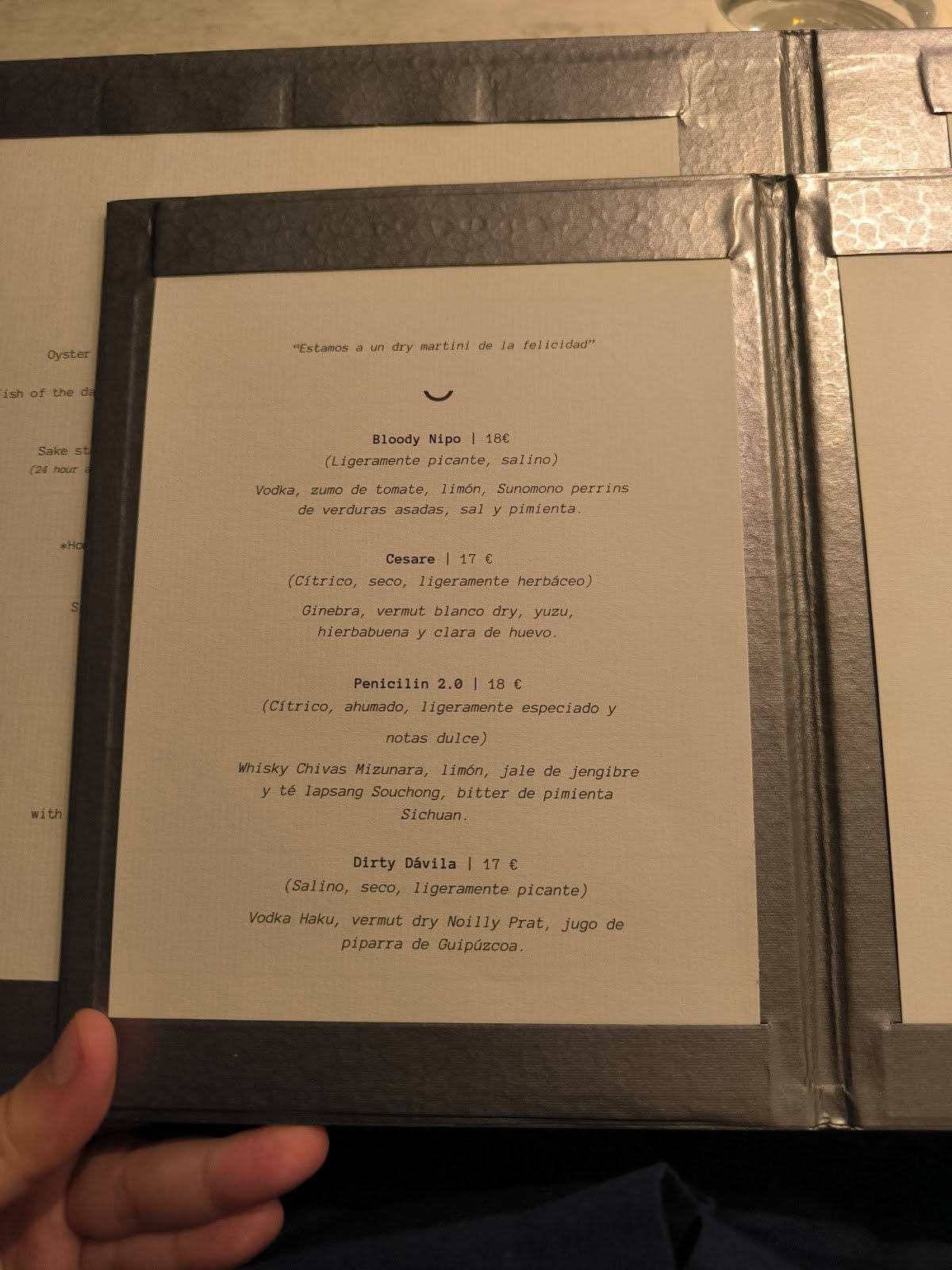
I opted for the long Omakase menu, which cost EUR 185. Note that each Omakase menu can be different and the price can vary even if you get the same number of dishes.
Ugo Chan – Food
The appetizer was a thing wafer infused with seaweed, a dish paying homage to Horcher restaurant in Madrid. Together, there was a pork pate from gyoza filling, served with Cumberland sauce. The pate was really delicious and a great combination with the sweet redcurrant jelly sauce.
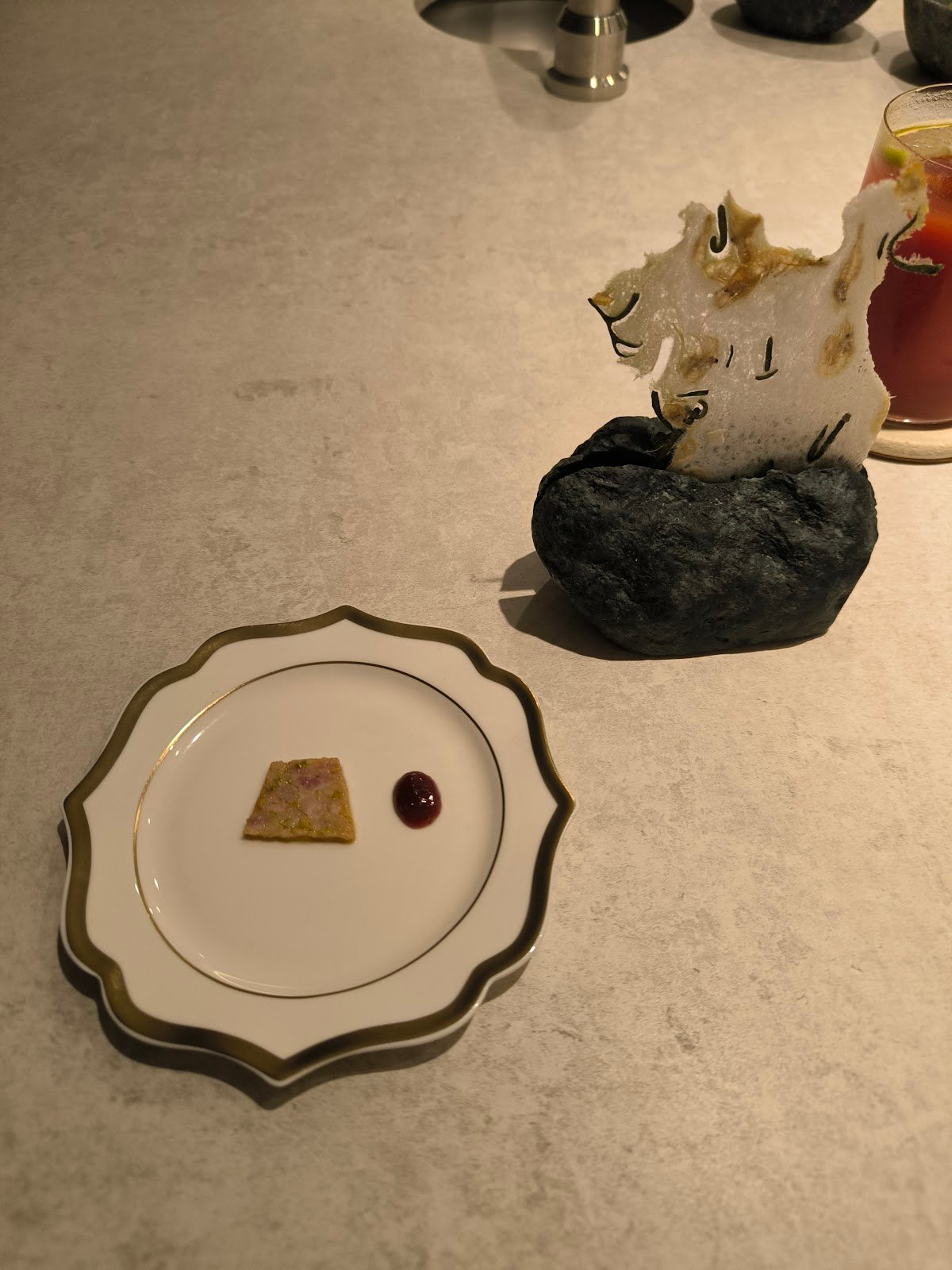
The oyster from Oleron island no2 with ponzu and chili oil was fresh, acidic and slightly spicy. On the side, a clam with a nice spicy Portuguese-inspired sauce.
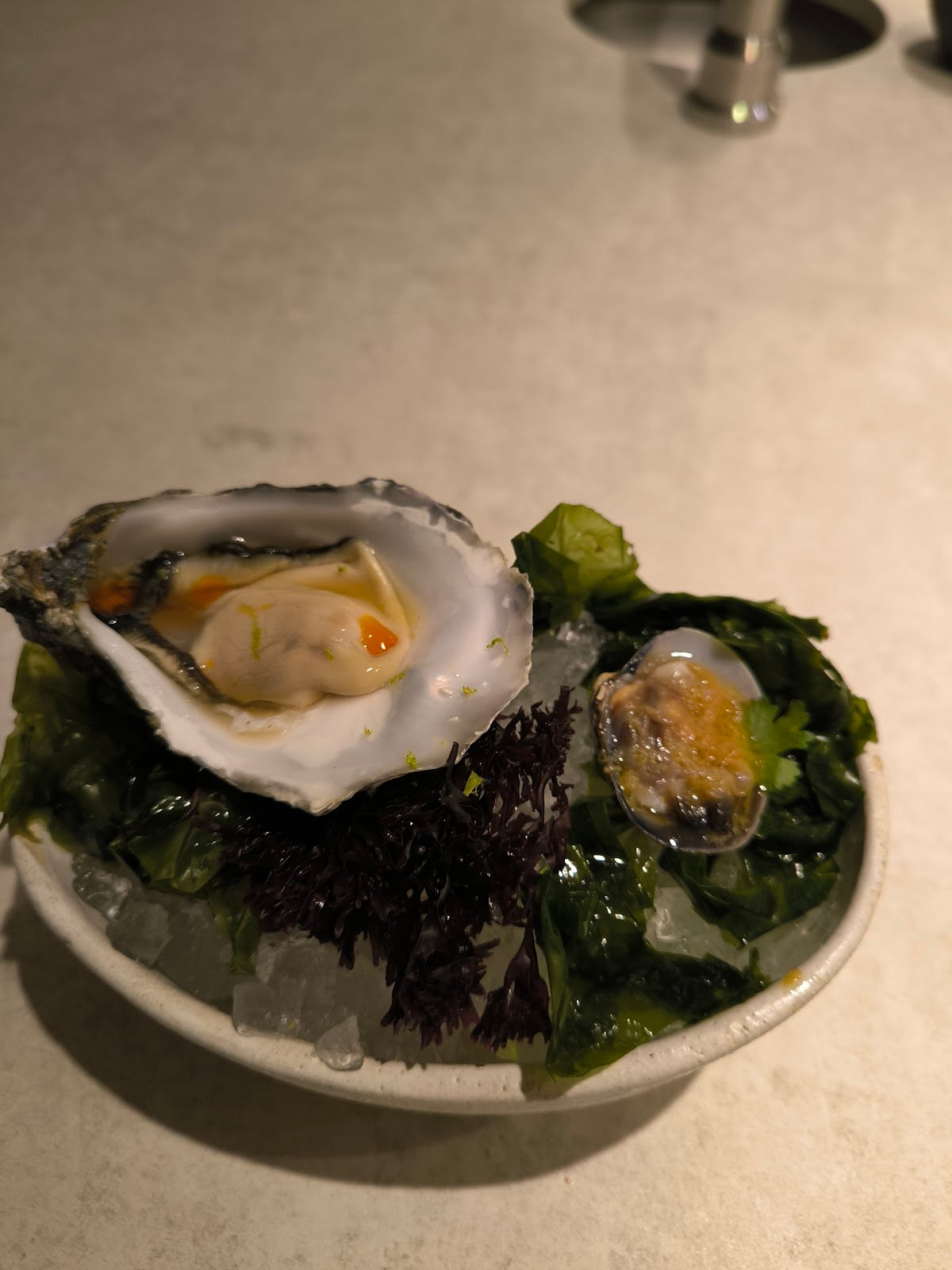
One of the most famous dishes is the Caviar lentil Japanese curry, served with wood pigeon breast tataki and coconut foam. Slightly spicy and with a deep flavour from the curry spices. The tataki was also top notch and great, combined with the curry flavour.
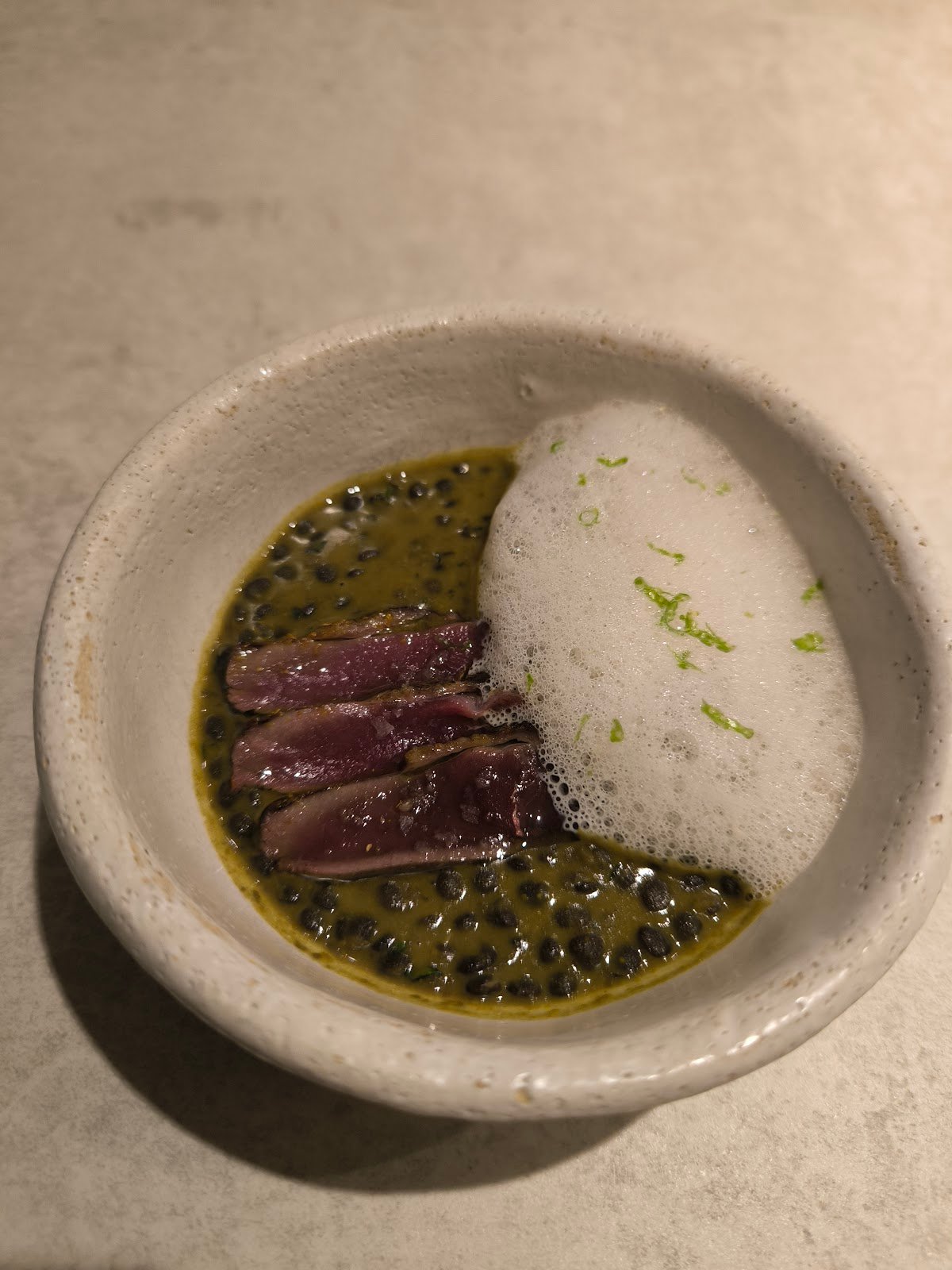
Ugo Chan’s version of tomato salad is a hydrated tomato stuffed with toro tuna and a sauce made from tuna and dashi. The staff topped it with bottarga when it was served. A fresh and acidic as well as technically impressive dish.
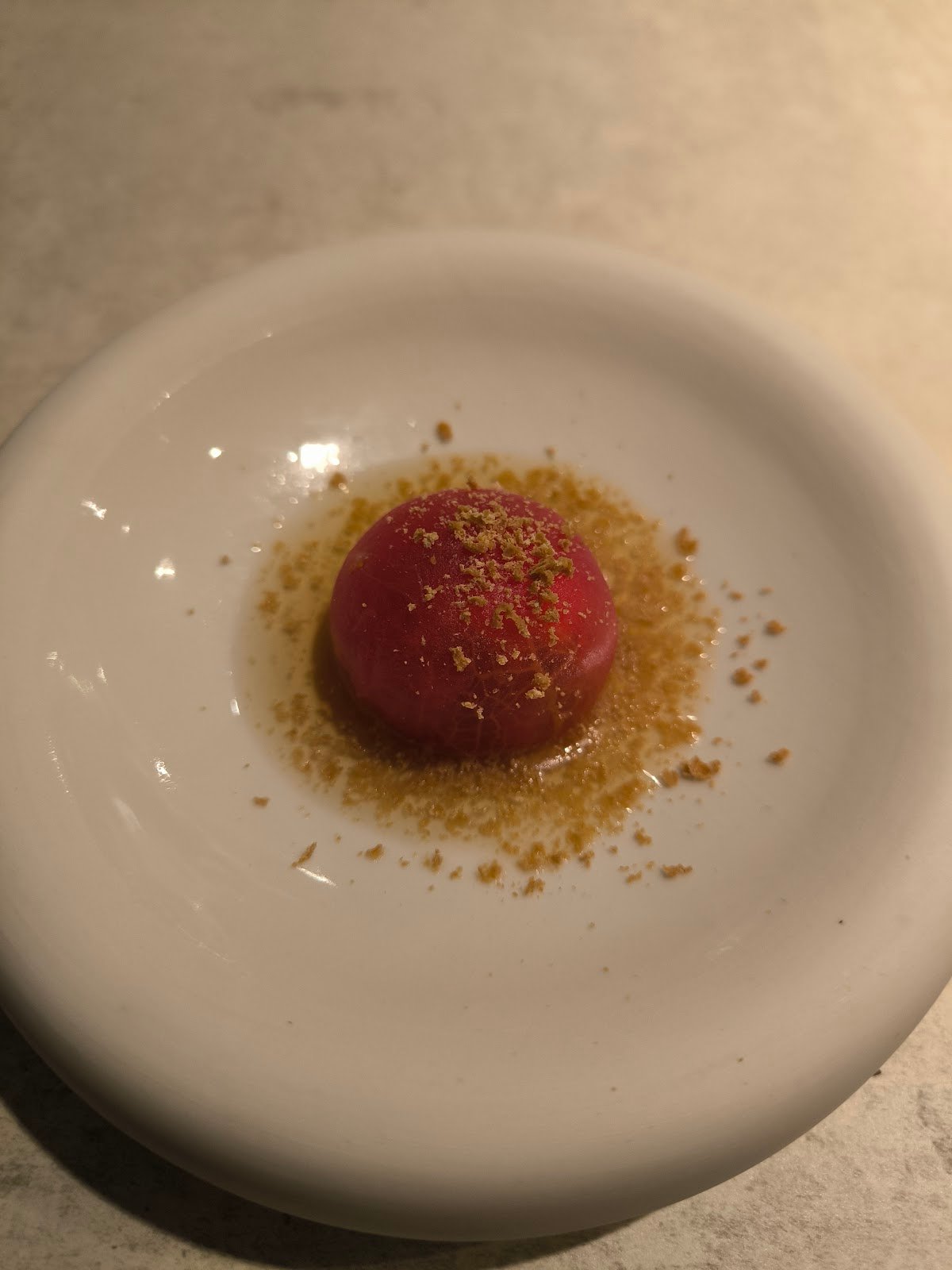
A more seasonal dish was the stuffed zucchini flower with Galician San Simon cheese. On the side, tomatillo and a Mexican-picked jalapeno chili salsa. The salsa was spicy and refreshing, so it worked well with the rich cheese-filled zucchini flower.
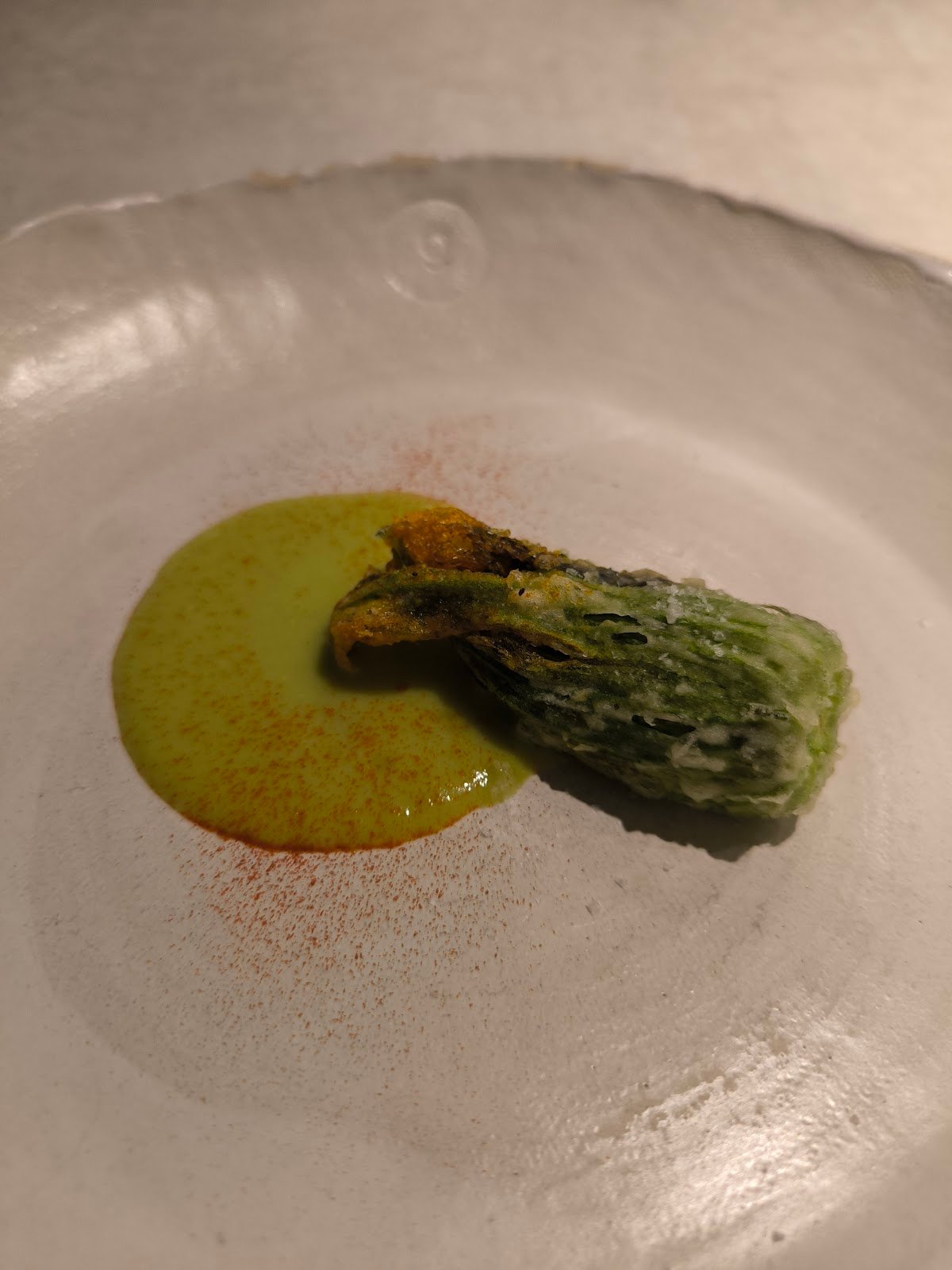
The Russian salad interpretation came with tuna sashimi, potatoes, baby carrots, peas and mayo as well as some ponzu sauce. The vegetables were crisper than the usual mushy texture you get in Russian salad, although I usually like them mushy in this context. The savory mayo was great.
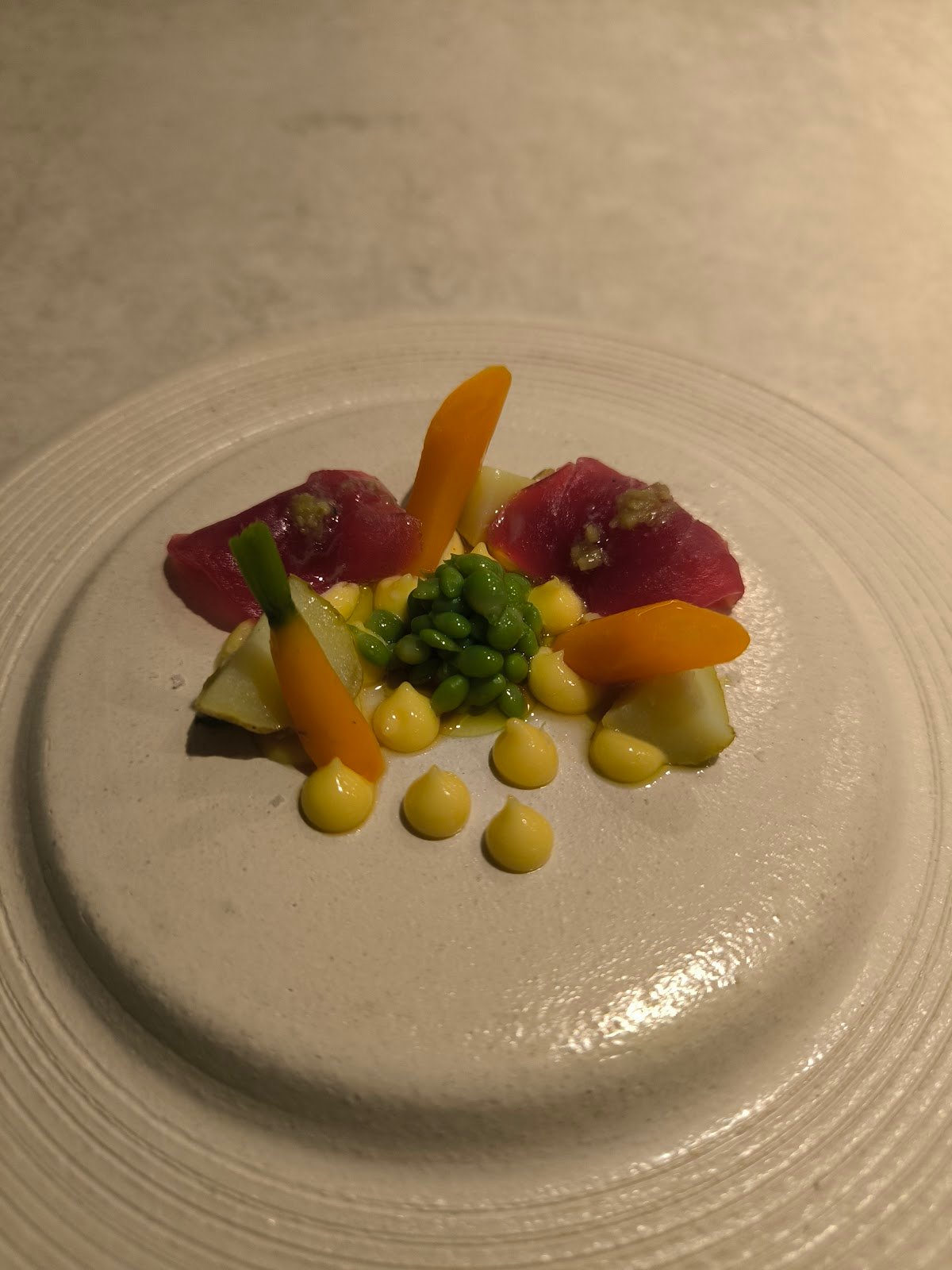
The baby squid was cooked on a Japanese barbecue and part of it was fried in tempura. Topped with a mini green onion and served with a Japanese onion-based sauce. It had a very smooth texture, which I enjoyed, although I don’t think it was anything special flavour-wise.
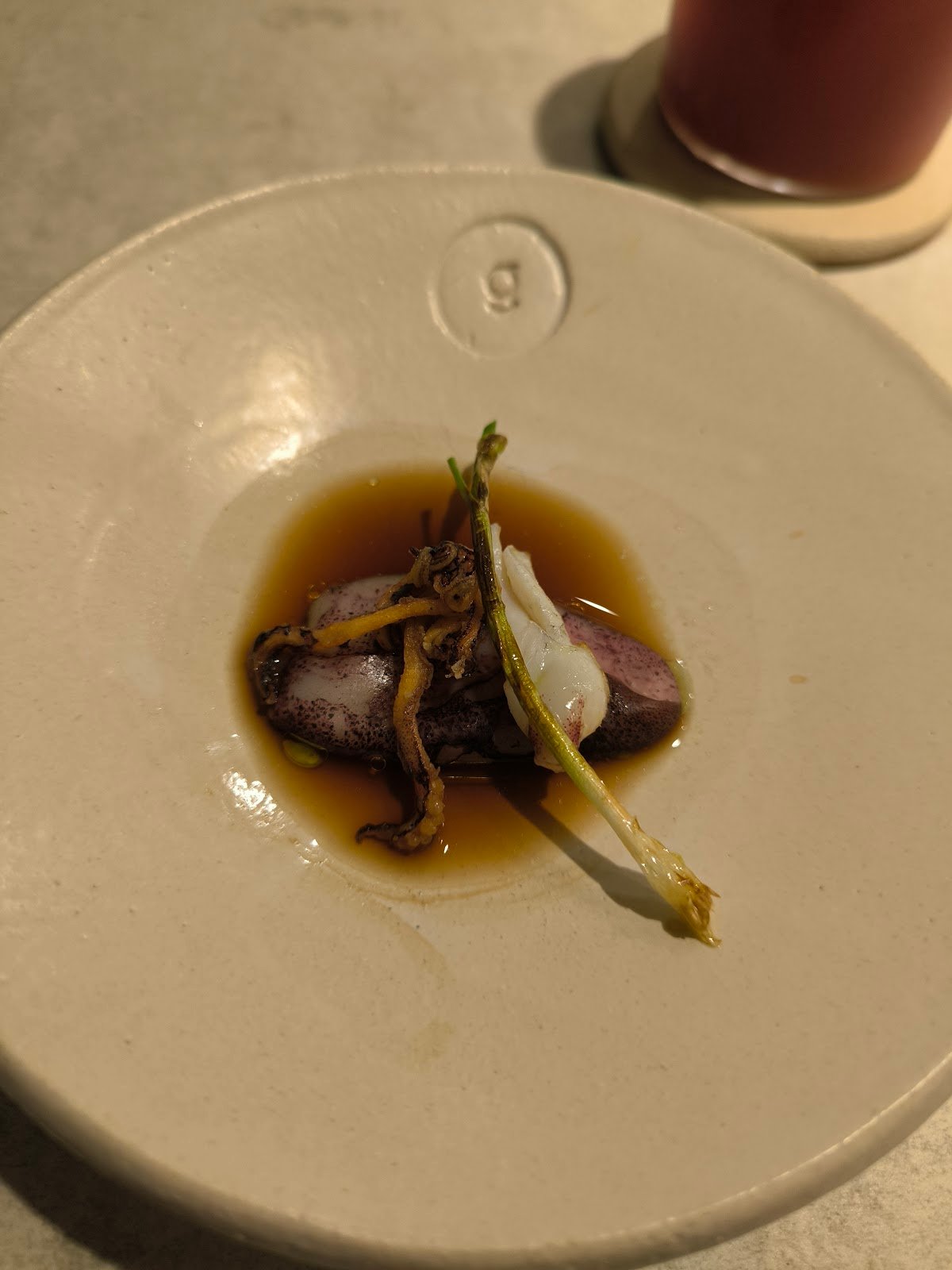
Another seasonal dish was the asparagus puree with asparagus tartare, mushroom and hamachi. The flavour was there and I love hamachi although I found the puree slightly bitter.
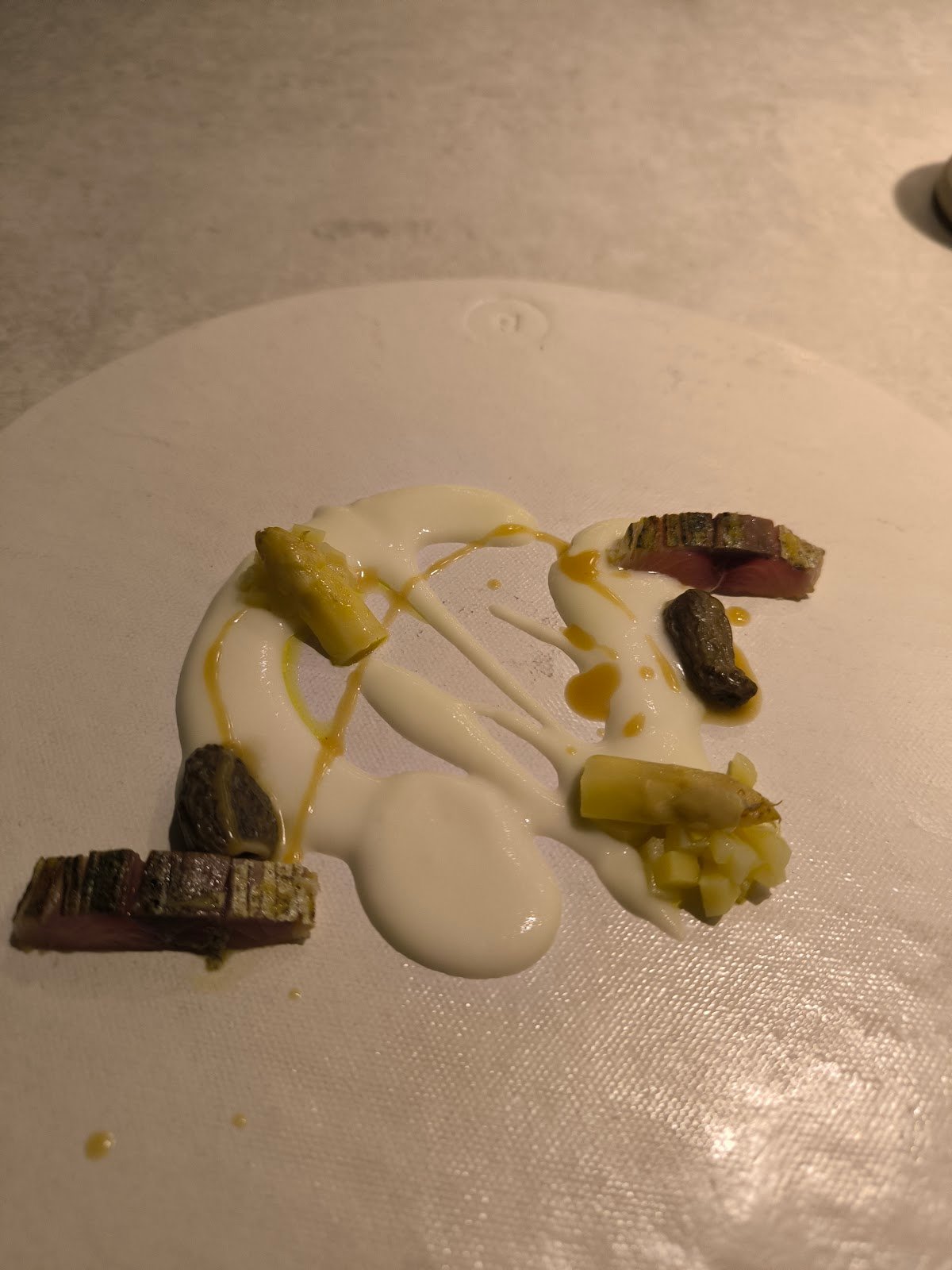
The next dish was a grilled aubergine with tuna tataki and green pippara pepper puree. The tuna, together with the smoked aubergine, was delicious. The pippara puree was bitter without being acidic, so I didn’t particularly enjoy it in combination with the rest of the elements.
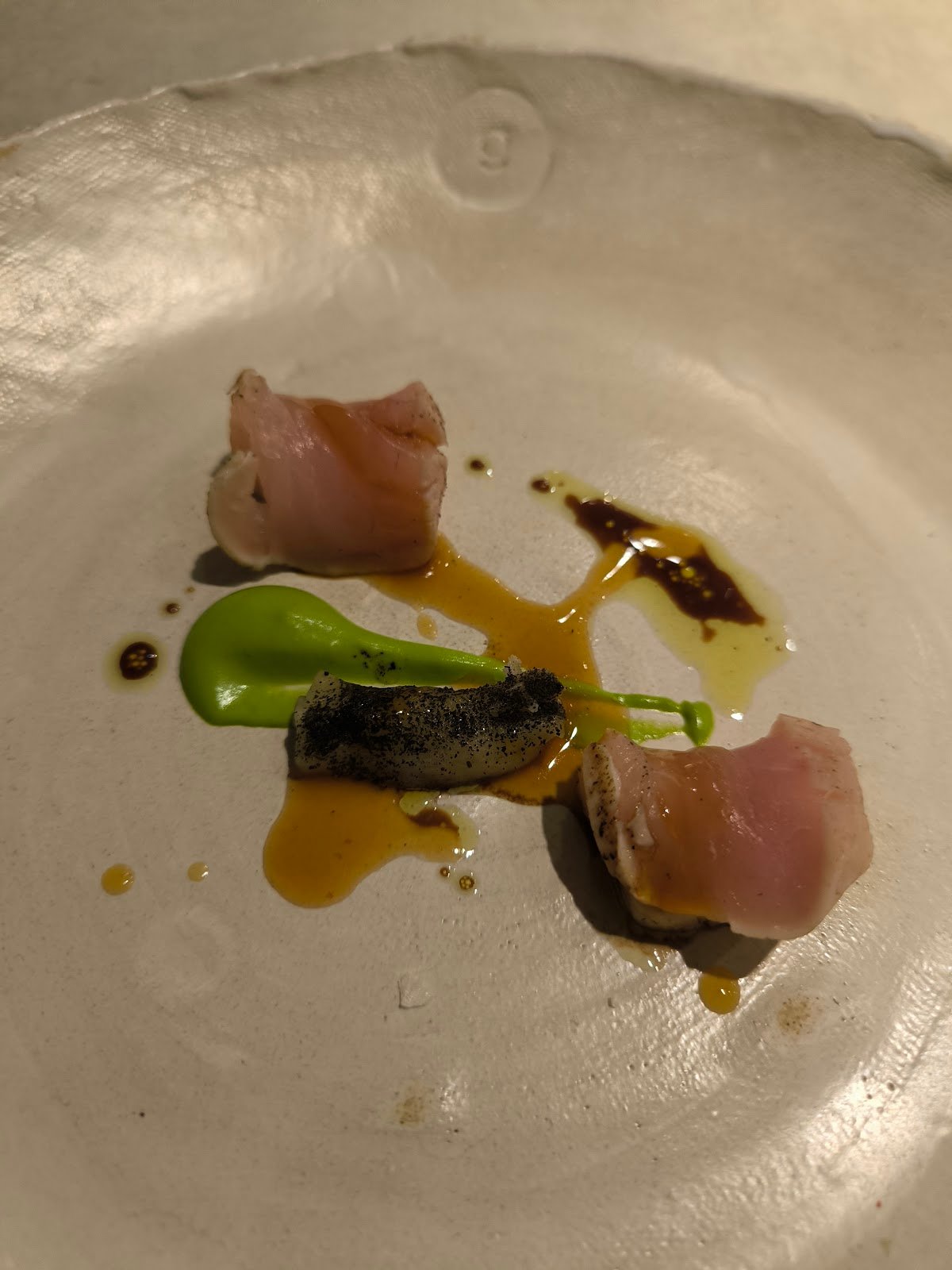
The hake is a dish that pays homage to Sacha restaurant and its pil-pil cod. In this interpretation, the koji-marinated hake is served with cured egg yolk flakes and a foam from the fish head with shisho salt. One of my favourite dishes from this meal.
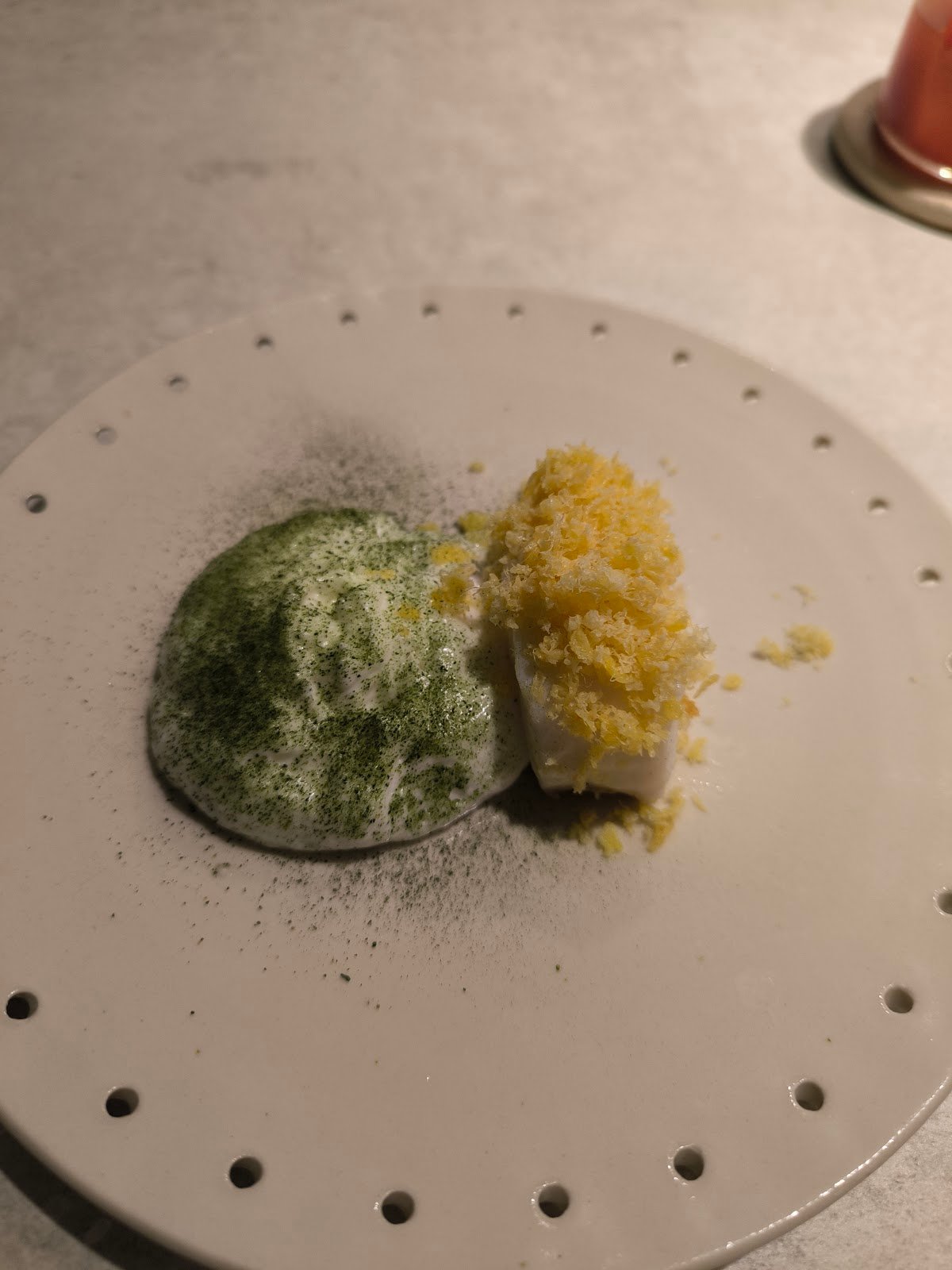
The Madrid-style tripe gyoza with crispy chickpeas is one of Ugo Chan’s legendary dishes. I am not a fan of tripe, but this was a very smooth dish and I loved the texture of the steamed gyoza. I can see the appeal of this dish.
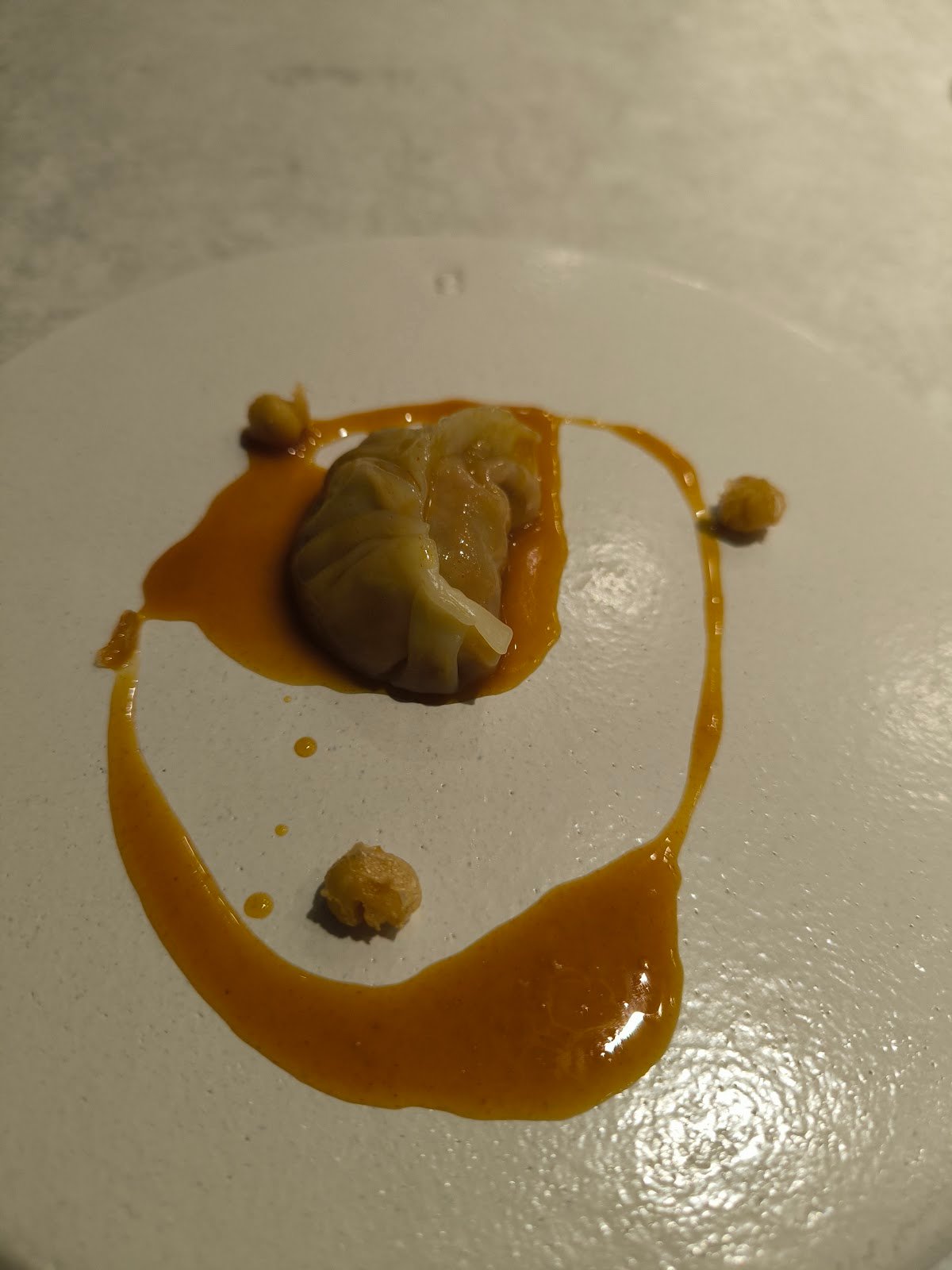
The sea bass nigiri with Iberian pork fat was very rich and flavourful.
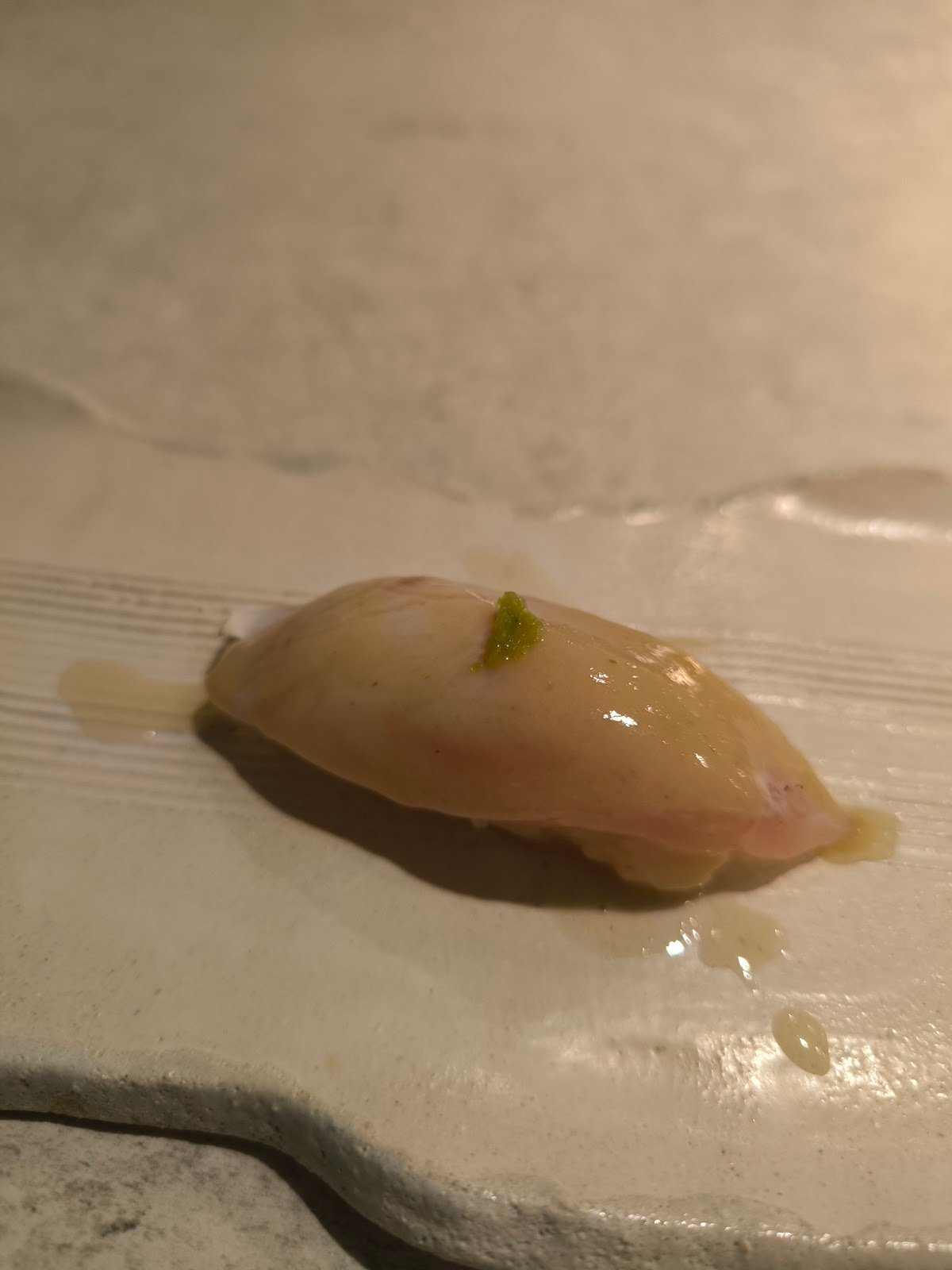
The tuna nigiri with Catalonian tomato and shredded Lingua di forno Italian bread was really playing with a lot of Mediterranean flavours (tomato, bread, olive oil), so it was quite an interesting combination for a nigiri.
However the most interesting nigiri was the one with the quail egg, a leaf of potato chips and migas crumble. Really reminded me of a tortilla de patatas in a nigiri format.
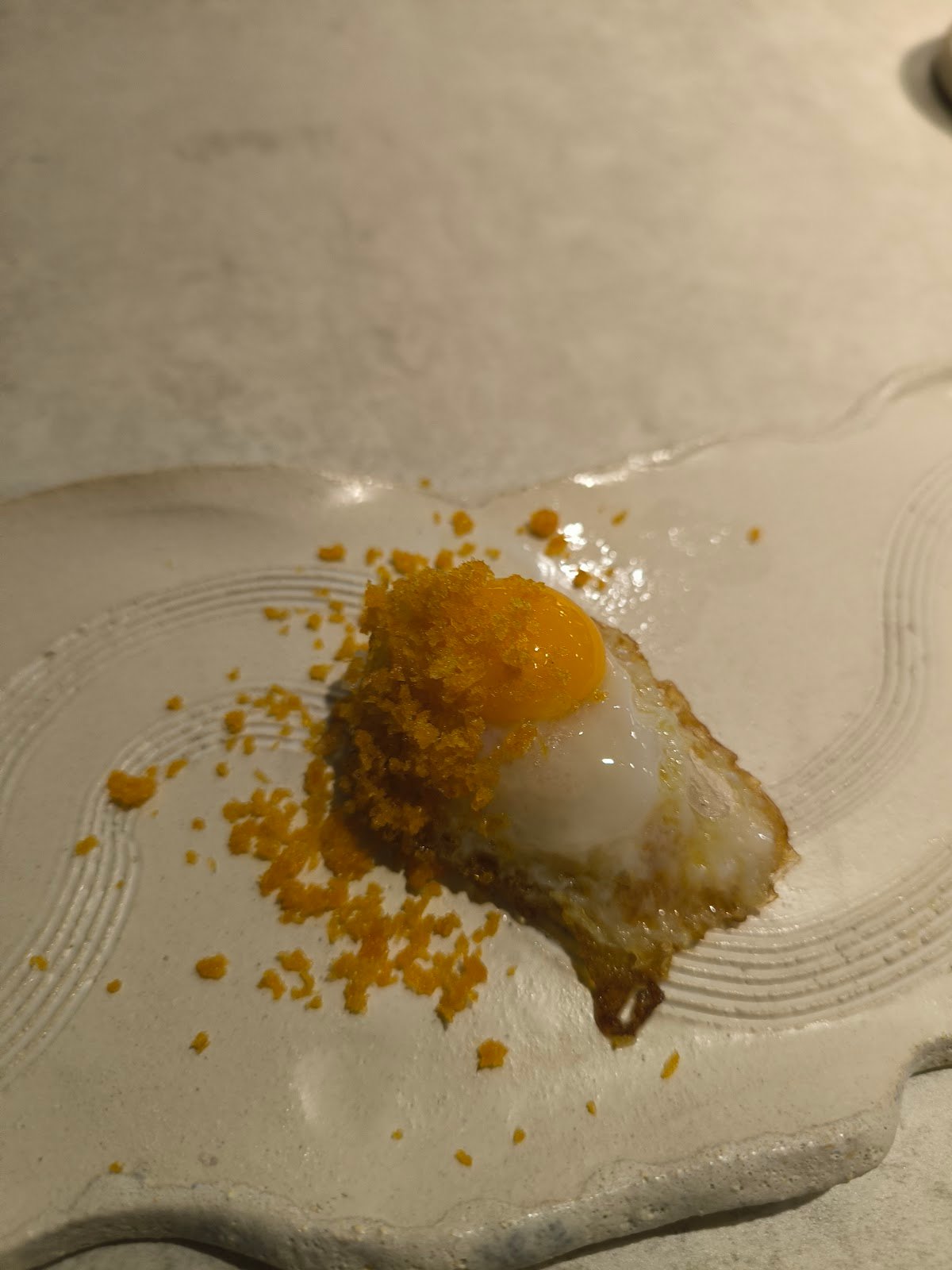
Next up, the foie gras nigiri with smoked eel and green apple cream. Classic flavour combinations, which I really enjoy and smoked eel is one of my favourite things on its own anyway.
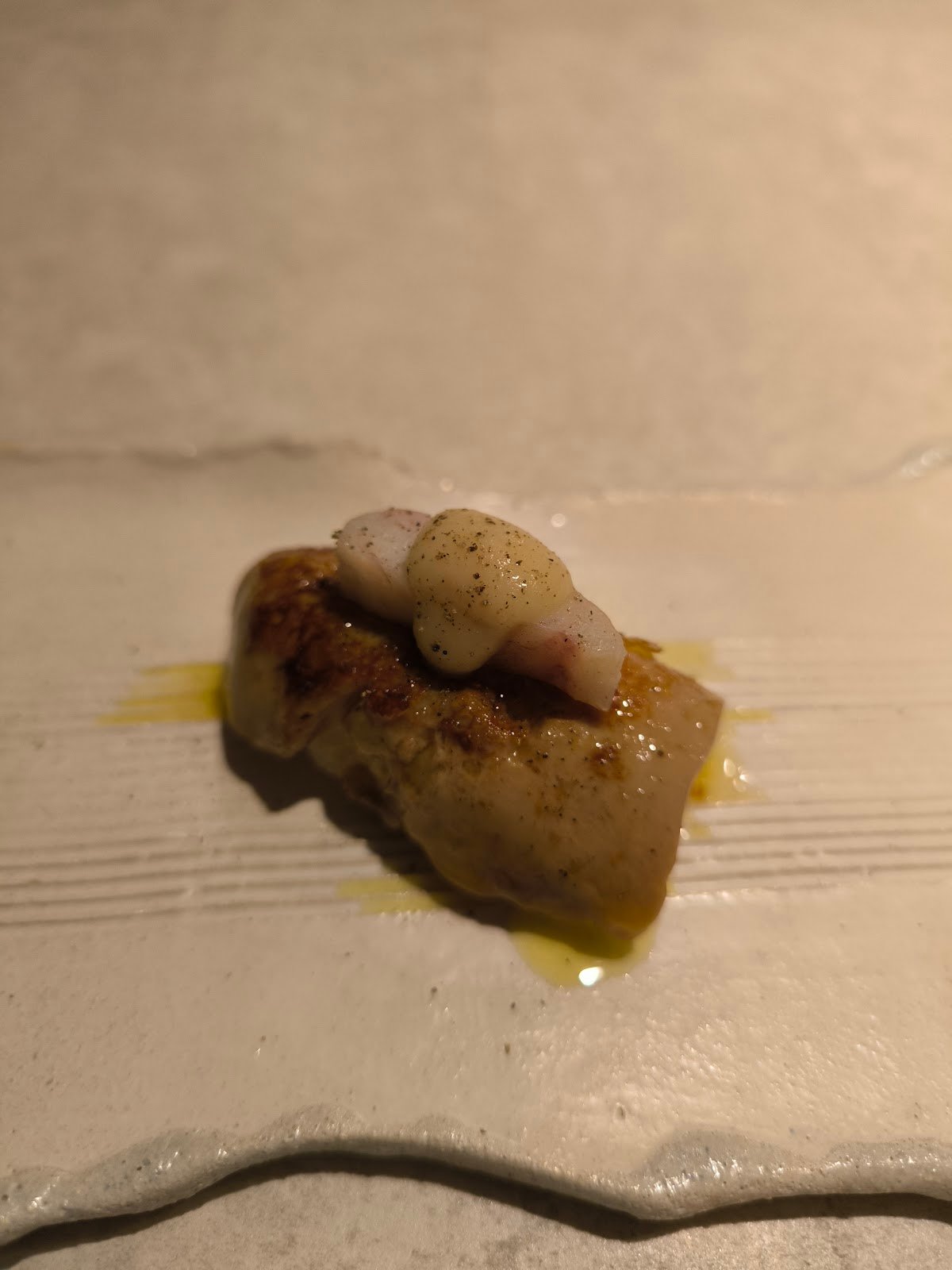
The next temaki bite was a play on fried pork ear which is a common element in tapas bars in Spain. Here it was served tempura fried with kimchi may and rice at the bottom of the seaweed.
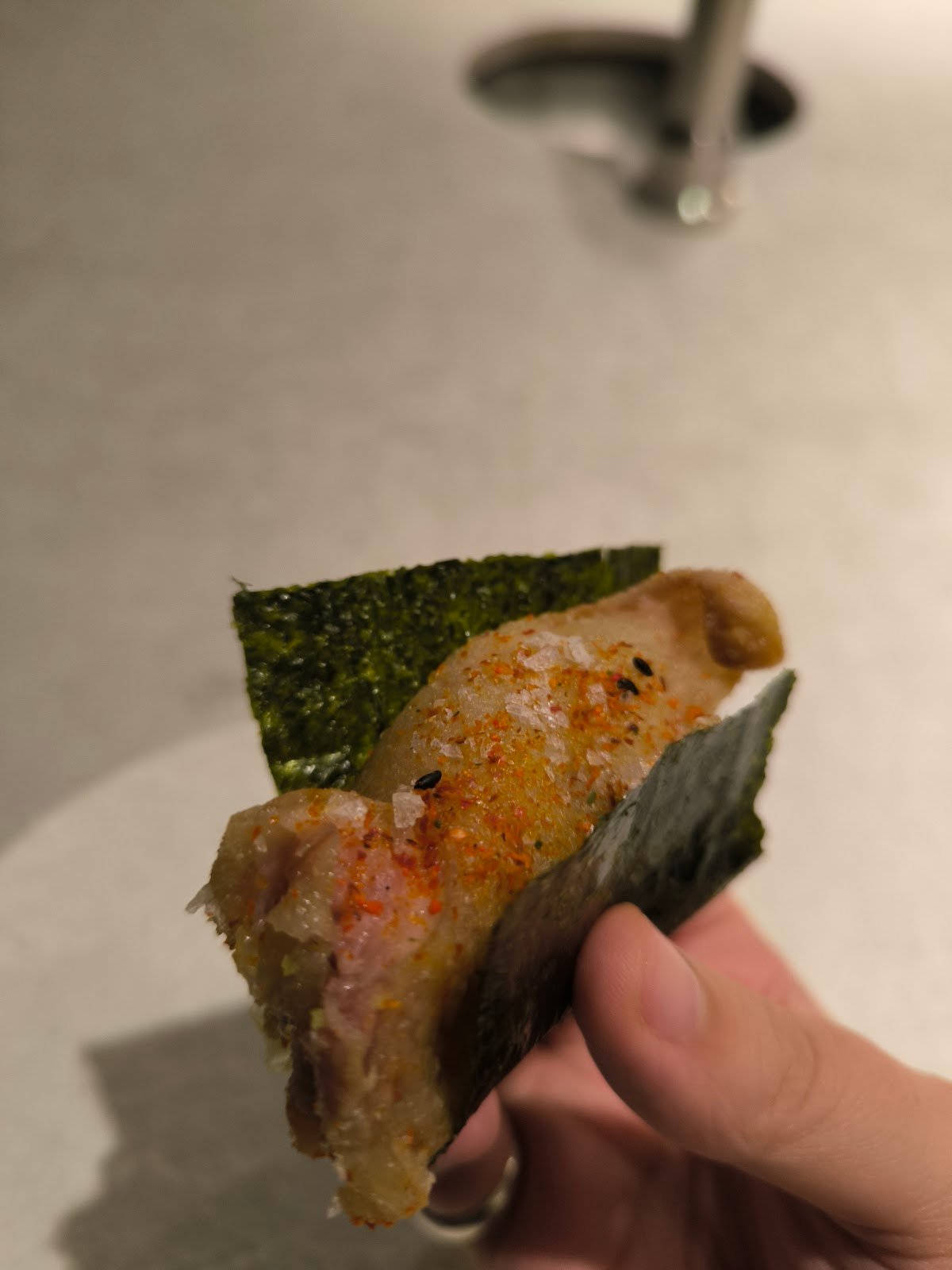
After indeed a long omakase menu it was time for dessert. I opted for a chocolate and seaweed combination. Ot came with a sesame cream and black sesame seeds. The star was the decadent high cacao percentage chocolate which was creamy and delicious.
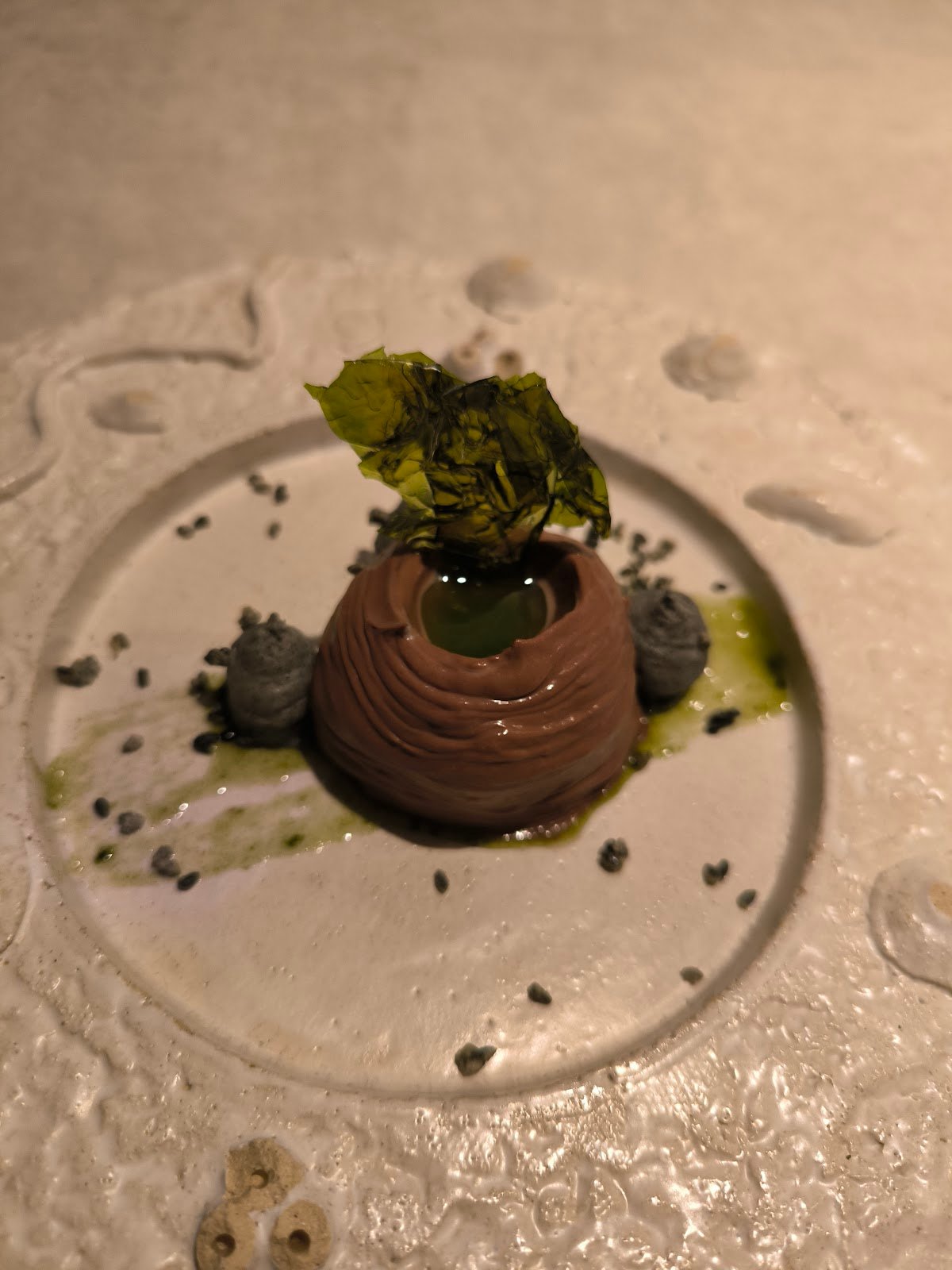
Conclusion
All in all, Ugo Chan redefines what Japanese cuisine can be. With emphasis on seasonality and high-quality ingredients, there is no doubt that you are in for a great experience. Definitely recommended for anyone who loves Japanese cuisine and wants to splurge for the experience. Alternatively, you can opt for a restaurant like Sr. Ito, which offers more casual Japanese fusion at a lower price point.
Visit: July 2025